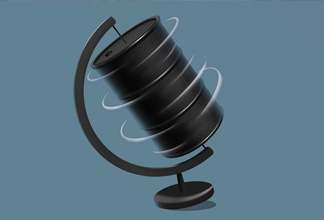How a Split-Second Pause Can Benefit Your Brain
Written by Sylvia Stewart
Published on February 13, 2018
minute read
Share:
How split is a split-second decision? Researchers at Columbia University crunched the numbers: Even a 50 to 100 millisecond pause — just one-tenth of a second — allows your brain to focus on relevant information while blocking distractions. In fact, the "speed-accuracy tradeoff" is just as it sounds: The longer your reaction time, the greater your accuracy.
Here's how the researchers did it. Parked in front of a computer screen with random-moving dots, participants were asked in which direction the dots moved and to answer either as quickly or as accurately as possible. Researchers then recreated the situation with a time limit and compared the rates of success. Their result? Those who paused even for a moment yielded better responses.
"...the "speed-accuracy tradeoff" is just as it sounds: The longer your reaction time, the greater your accuracy."
Now forget those dots and imagine how much better your decision-making might be if you embraced the old adages of "sleep on it," "take your time," "think before you speak," etc. and made a conscious effort to take a moment. It's a very small thing to do, but has a huge potential payoff. In Freedom and Destiny, existential psychologist Rollo May writes, "Freedom is the capacity to pause in the face of stimuli from many directions at once and, in this pause, to throw one's weight toward this response rather than that one."
The "pause" is useful in just about every facet of your life, but perhaps extra helpful when applied to money and investing. That pause could help keep common investing emotions like excitement, anxiety or anger in check. Each of those can cause rash decisions when it comes to investing, but taking a moment to reflect on why you're making a particular investment can help ensure it's right for you. Hey, anything that can help keep emotions at bay when making investing decisions must have some merit!
Here are three ways the pause can be put to use.
1. Pausing forces you to stop and listen.
Ever catch yourself interrupting someone — even with an "of course" or "I know"—before they've ended their sentence? If you're jumping the gun to get a meaningless phrase in, you're distinctly not listening to whatever sage advice they're giving you. Taking time to really listen and consider what you just heard may just help combat what's known as confirmation bias. It's our tendency to pay attention only to information that confirms our existing ideas or beliefs while ignoring information that contradicts them. As investors, it's a bias that can affect our decisions. How can we be making our best choices if we're filtering out some of the important details?
2. Pausing makes you (at least seem) smarter
Besides the obvious perk of polite human interactive skills, pausing does double duty by letting the person on the other end of the conversation know you're actually listening and value their knowledge. Even better, that moment of wise silence easily reads as deep thought and gives you time to react appropriately. Think of it like the pause before making an investing decision when you might ask yourself: Is this stock the right one for me? Am I comfortable with the risk I'm taking on? Does this fit with my investment strategy? And once your decision is made, one final pause before hitting the buy or sell button can ensure all your order details are accurate.
3. Pausing often gives you more information without even asking.
Try this clever conversation trick: When someone stops talking, don't jump right in with whatever pops to mind. Give just a moment of silence and you may get more detailed information than you expected.
RBC Direct Investing Inc. and Royal Bank of Canada are separate corporate entities which are affiliated. RBC Direct Investing Inc. is a wholly owned subsidiary of Royal Bank of Canada and is a Member of the Investment Industry Regulatory Organization of Canada and the Canadian Investor Protection Fund. Royal Bank of Canada and certain of its issuers are related to RBC Direct Investing Inc. RBC Direct Investing Inc. does not provide investment advice or recommendations regarding the purchase or sale of any securities. Investors are responsible for their own investment decisions. RBC Direct Investing is a business name used by RBC Direct Investing Inc. ® / ™ Trademark(s) of Royal Bank of Canada. RBC and Royal Bank are registered trademarks of Royal Bank of Canada. Used under licence. © Royal Bank of Canada 2018. All rights reserved.
The views and opinions expressed in this publication are for your general interest and do not necessarily reflect the views and opinions of RBC Direct Investing. Furthermore, the products, services and securities referred to in this publication are only available in Canada and other jurisdictions where they may be legally offered for sale. If you are not currently resident of Canada, you should not access the information available on the RBC Direct Investing website.
Explore More

What Investors Can Learn from Hockey Star and RBC Olympian Sarah Nurse
Nurse's path to the podium reveals how preparation, planning and practice can turn potential into a golden opportunity
minute read

Crude Questions? A Look at Canada’s Oil Economy
What you need to know about Canada’s oil industry
minute read

How Inflation-Proof Are Your Investments?
Why inflation still matters – and how to stay ahead of it
minute read
Inspired Investor brings you personal stories, timely information and expert insights to empower your investment decisions. Visit About Us to find out more.







